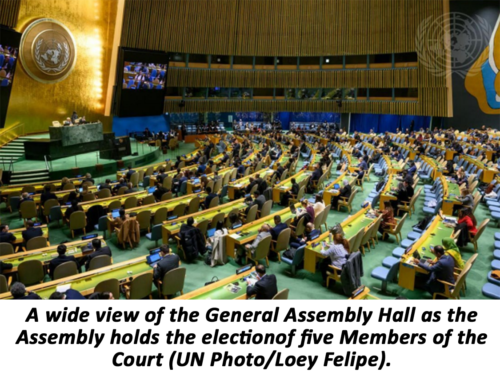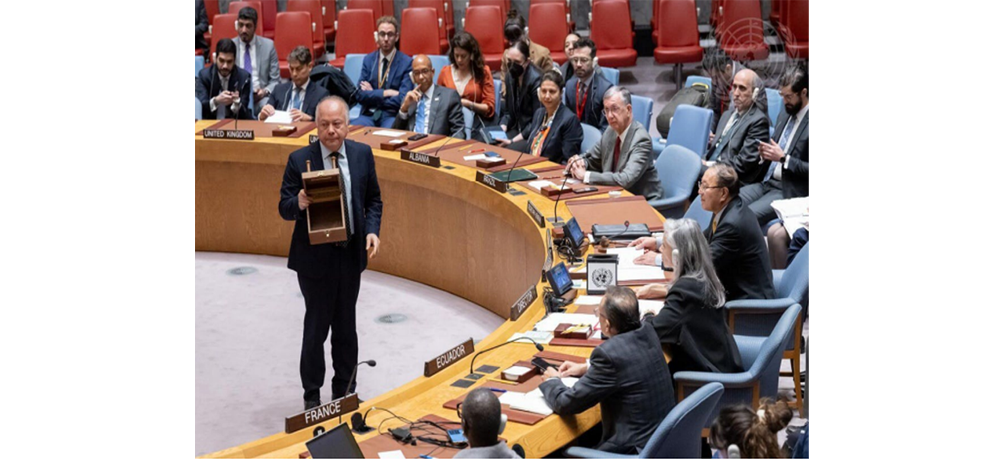Photo: A Conference Officer shows the empty ballot box during the meeting in the Security Council (UN Photo/Manuel Elias).
Belize’s Foreign Minister says the elections were transparent and there is full confidence in the independence and impartiality of all judges on the ICJ.
BELMOPAN, Thurs. Nov. 16, 2023
The elections for new judges of the International Court of Justice (ICJ), the principal judicial organ of the United Nations, took place on Thursday, November 9. The vote is done by the General Assembly and the Security Council of the United Nations via secret ballot. The two entities vote at the same time, but not together, so that the vote in one organ is not influenced by the vote in the other. Contenders must attain an absolute majority of votes in both chambers.

Five judges were elected to serve a period of nine years starting on February 6, 2024. In the case of Judge Hilary Charlesworth from Australia, she was re-elected. Elected as new members were Bogdan-Lucian Aurescu of Romania, Sarah Hull Cleveland of the U.S.A., Juan Manuel Gómez Robledo of Mexico, and Dire Tladi of South Africa. After the new judges take their seat, the Court will elect a president and vice-president from among its members to serve for three years. Kirill Gevorgian of Russia failed in his re-election bid. Another three judges who did not receive enough votes to make it on the ICJ bench were from Egypt, the Democratic Republic of the Congo and Zambia respectively.
The Court comprises 15 judges. No two judges can be of the same nationality. Nominees are not named by states, but rather, by national groups whose members have varying degrees of independence from governments.
Staying on as judges on the new bench in 2024 will be Ronny Abraham of France, Abdulqawi Yusuf of Somalia, Dalveer Bhandari of India, Nawaf Salam of Lebanon, Leonardo Nemer Caldeira Brant of Brazil, Peter Tomka of Slovakia, Xue Hanqin of China, Julia Sebutinde of Uganda, Yuji Iwasawa of Japan and Georg Nolte of Germany. Apart from the judge from Russia, also vacating their seats in 2024 are judges from Jamaica, Morocco, and the U.S.A. Belize’s Minister of Foreign Affairs, Hon. Eamon Courtenay, told Amandala today, “Belize believes that the election of judges to the ICJ bench was transparent. We have full confidence in the independence and impartiality of all judges on the ICJ.”
Guatemala’s territorial, insular and maritime claim to Belize was remitted to the ICJ on June 7, 2019. The stage of written submissions concluded on June 7, 2023 with Belize’s delivery of its Rejoinder in the case. The countries are now awaiting the oral hearings that usually last about two weeks. According to Belize’s Minister of Foreign Affairs, a date for the oral hearings should be known by June 2024. Today he indicated that the parties would be notified of the date for the hearings about 4-6 weeks in advance.
According to article 53 (2) of the Rules of the Court, “The Court may, after ascertaining the views of the parties, decide that copies of the pleadings and documents annexed shall be made accessible to the public on or after the opening of the oral proceedings.” At the time Guatemala submitted its claim, known as a memorial, on December 8, 2020, Belize’s Ministry of Foreign Affairs stated that “The most explicit formulation of the claim made in modern times was that contained in a letter from Guatemala’s Foreign Minister addressed to Belize’s Prime Minister on 18 October 1999 (attached) in which, although the claim to other parts of the territory was not expressly abandoned, Guatemala declared that the territory between the rivers Sibun and Sarstoon should ‘revert’ to Guatemala, being an integral part of the Verapaz province. The letter also protested the ‘de facto occupation of the islands adjacent to Belize.’ Guatemalan governments since then have tended to follow the line laid down in that letter and have refrained from claiming the entire territory.” The release also noted that keeping in line with non-disclosure rules of the ICJ, Belize’s government could only reveal that “Guatemala’s Memorial presents no surprises, no new claims that are different from those that have been made at different times in the past, which are well documented.” Belize reaffirmed its confidence in its “sovereignty over all the territory we succeeded to from the United Kingdom at independence on 21 September 1981 and over all the maritime areas to which we are entitled by the law of the sea.”
Belize’s international team remains unchanged since inception and includes Senior Counsel Sam Wordsworth KC, Dr. Ben Juratowitch KC and Mathias Forteau; Junior Counsel Amy Sander, Philippa Webb and Kate Parlett; Support Counsel Catherine Drummond and Jamie Trinidad and hydrographer/geographer Robin Cleverly. Guatemala’s team, as announced back in December 2020, includes Alain Pellet, described as a prestigious French jurist who Guatemala says has been following the case some 20 years; Rodman Bundy, ex-president of the International Law Commission of the United Nations who has 35 plus years of litigation experience in public international law (and was recognized in 2013 as the best arbitration lawyer of France); Alina Miron, a French-Romanian professor of international law and expert in maritime law; British national, Sir Michael Wood, considered one of the most distinguished international attorneys, who has represented many states before the ICJ and the International Tribunal for the Law of the Sea; and Argentine Marcelo Kohen, professor of international law at the Graduate Institute of International and Development Studies of Geneva. Guatemala’s legal team is assisted by advisors and a select group of Guatemalan professionals, including attorneys, historians, archivists, translators, diplomats and paleographists (archaeologists who study prehistoric people and their culture.)
The oral hearings of the Court are public unless it is decided there will be a closed hearing. Attendance is welcomed, as the Court hopes public attendance would increase public awareness of its work and how it functions. More information on attending an oral hearing is available on the Court’s website.
The ICJ is located in the Peace Palace in The Hague (Netherlands).

